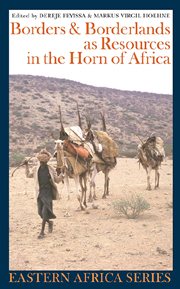Book contents
- Frontmatter
- Contents
- List of Maps, Tables & Charts
- Preface by Günther Schlee
- Editors' Preface
- Notes on Contributors
- List of Acronyms
- 1 State Borders & Borderlands as Resources
- 2 More State than the State?
- 3 Making Use of Kin beyond the International Border
- 4 The Tigrinnya-speakers across the Borders
- 5 Trans-Border Political Alliance in the Horn of Africa
- 6 People & Politics along & across the Somaliland-Puntland Border
- 7 The Ethiopian-British Somaliland Boundary
- 8 The Opportunistic Economies of the Kenya-Somali Borderland in Historical Perspective
- 9 Magendo & Survivalism
- 10 Can Boundaries not Border on One Another?
- 11 Conclusion
- Index
- EASTERN AFRICAN STUDIES
8 - The Opportunistic Economies of the Kenya-Somali Borderland in Historical Perspective
Published online by Cambridge University Press: 05 April 2013
- Frontmatter
- Contents
- List of Maps, Tables & Charts
- Preface by Günther Schlee
- Editors' Preface
- Notes on Contributors
- List of Acronyms
- 1 State Borders & Borderlands as Resources
- 2 More State than the State?
- 3 Making Use of Kin beyond the International Border
- 4 The Tigrinnya-speakers across the Borders
- 5 Trans-Border Political Alliance in the Horn of Africa
- 6 People & Politics along & across the Somaliland-Puntland Border
- 7 The Ethiopian-British Somaliland Boundary
- 8 The Opportunistic Economies of the Kenya-Somali Borderland in Historical Perspective
- 9 Magendo & Survivalism
- 10 Can Boundaries not Border on One Another?
- 11 Conclusion
- Index
- EASTERN AFRICAN STUDIES
Summary
Introduction
The history of the Somalia-Kenya borderland over the past century offers a classic example of the ways international boundaries can create opportunities as well as hardships for the peoples who live along and across them. This borderland has long been a site of contact among various ethnic/linguistic communities, among sedentary and mobile populations, and among competing political authorities with different concepts of sovereignty and legitimacy (see, e.g., Schlee 1989; Menkhaus 2005). Over time, these interacting groups constructed a series of cross-border alliances, financial networks and commercial mechanisms which came to constitute a distinct and dynamic frontier economy. While operating largely outside the ‘official’ economies of colonial and independent Kenya and Somalia, borderland traders contributed substantially to the growth of several sectors of both national economies in the past and have more recently become important actors in the emergence of a wider regional economy in the Horn of Africa.
While the topic of cross-border trade has not been completely ignored in the historical literature, most contemporary scholarship on the Kenya- Somalia frontier has been preoccupied with issues of ethnic conflict, political instability and criminal activity, giving the impression that the borderlands were at best a costly nuisance and at worst a serious security threat to states in the region. It is certainly the case that many economic activities associated with the border areas such as livestock raiding, banditry, smuggling, gun-running and the like were and still are considered illegal by state authorities, and as such have required policing and occasional military intervention by those authorities.
- Type
- Chapter
- Information
- Borders and Borderlands as Resources in the Horn of Africa , pp. 133 - 150Publisher: Boydell & BrewerPrint publication year: 2010



